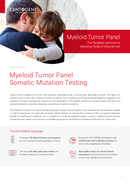Somatic Mutation Testing for Myeloid Tumors
Genetic testing for myeloid tumor at CENTOGENE can provide you with valuable information for diagnostic decisions, prognosis, therapeutic approaches and patient counseling
Myeloid Tumor Panel – Somatic Mutation Testing
The myeloid tumor panel targets important regions within 35 genes that are frequently mutated in myeloid malignancies. Myeloid malignancies are clonal diseases of hematopoietic progenitor cells. Myeloid tumors represent the fourth most frequently diagnosed cancer in economically developed countries.
Benefits of myeloid tumor panel genetic testing
- Enables rapid eligibility identification and patient stratification for clinical trials
- Allows longitudinal and serial molecular monitoring throughout the clinical trial process
- Can be conducted with fresh or frozen/archived blood and bone marrow samples
- Does not require special shipping or storage provisions
- Employs expert analysis from a CLIA-certified lab
- Identifies patients at high risk who are less likely to respond well to treatment
- Helps to determine the intensity of treatment each patient should receive
CENTOGENE's myeloid tumor panel offers:
- Our comprehensive myeloid tumor panel includes library preparation, sequencing, and data analysis and reporting in a cost-effective way and with a turnaround time of only ten days
- Myeloid tumor panel collectively assesses important regions within 22 genes with high accuracy, high sensitivity and at a mean coverage depth of >1,000x
- Myeloid tumor panel enables clinical researchers and physicians to access expert-defined content to investigate genomic features associated with hematological malignancies
- Myeloid tumor panel utilizes NGS sequencing and Illumina Platform
The goals of somatic testing of myeloid tumors
- Myeloid tumors that may respond to targeted therapies by assessing multiple gene targets simultaneously
- Specific mutations within genes known to be associated with response or resistance to specific cancer therapies
- Mutations that may help determine prognosis for patients with myeloid tumors
- The best therapeutic strategy for each patient
- The diagnosis that will reassure both patient and physician about the relevant health problem and all the possible solutions to improve it
Creating the mutational profile of myeloid tumors
The majority of myeloid tumors contain high numbers of somatic mutations, which are genetic changes that are not inherited but created within the tumor itself. Unlike inherited “germline” mutations these somatic mutations are not transmitted to offspring.
Somatic mutations significantly contribute to the pathogenesis, progression and prognosis of myeloid malignancies. Whole genome sequencing in several patients with myeloproliferative disorders pointed at several genes and variants, clearly associated in patients affected with myeloproliferative syndromes.
Genes which affect classification and prognosis of acute myeloid leukemias are FLT3, NPMT1, CEBPA. Recently IDH1 and also IDH2 have shown evidence to be informative as diagnostic markers. Additional genes are KIT, TP53, ASXL1, ATRX and SETBP1.
Who can be offered the myeloid tumor panel?
- Individuals with myeloid tumor: acute myeloid leukemia (AML), chronic myeloid leukemia (CML), myelodysplastic syndrome (MDS), myeloproliferative neoplasms (MPN), chronic myelomonocytic leukemia (CMML) and juvenile myelomonocytic leukemia (JMML). The results of this genetic test can be useful for assessing the prognosis and guiding the treatment of individuals with myeloid malignancies
- Patients without clinical diagnosis but with classical clinical symptoms and possible changes in the blood cells morphology and counts
- Individuals with early stage disease where a mutational profile from multiple genes informs diagnosis or disease stratification, prognosis, and treatment options
- For late-stage cancers, the test is designed to evaluate options for alternative treatments, including targeted therapies
| Gene test | Myeloid tumor panel |
|---|---|
| Gene names | ASXL1, ATM, CBL, CDKN2A, CEBPA, CREBBP, DNMT3A, ETV6, EZH2, FLT3, GATA2, HRAS, IDH1, IDH2, JAK2, KIT, KRAS, NF1, NOTCH1, NPM1, NRAS, PDGFRB, PHF6, PTPN11, RAD21, RUNX1, SF3B1, SMC1A, SMC3, SRSF2, STAG2, TET2, TP53, U2AF1, WT1 |
| Diseases covered | Acute myeloid leukemia (AML), chronic myeloid leukemia (CML), myelodysplastic syndrome (MDS), myeloproliferative neoplasms (MPN), chronic myelomonocytic leukemia (CMML) and juvenile myelomonocytic leukemia (JMML) |
| Turnaround time | 10 business days |
| How to order | Order a test |
Resources
Useful Links
Downloads

Myeloid Tumor Panel – Product Sheet
The targeted approach to detecting myeloid malignancies
Scientific Publications
Retrospective Diagnosing of Rare Disease Patients
Despite diagnostic exome/genome sequencing, patients remain without a diagnosis when the relevant gene-disease association is not yet known at the time of analysis. CENTOGENE therefore re-evaluates […]
In-Depth Characterization of a Novel Disease
Establishing a novel gene-disease link has immediate diagnostic implications, while therapeutic considerations require functional insights beyond genotype and phenotype. CENTOGENE researchers […]
Contributions to WGS Guidelines for Rare Disease Diagnostics
Proper genetic diagnostics relies on up-to-date guidelines. These have recently been revised for Whole Genome Sequencing (WGS) by a panel of European experts. CENTOGENE’s Chief Genomic and Medical […]
Get in Touch With Our Customer Support
Our consultation service is available in several languages.
+49 (0) 381 80 113 - 416
Mon. – Fri. 8 a.m. – 6:30 p.m. CET
For Spanish and Portuguese Partners:
